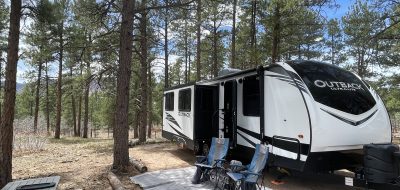
Taking care of your tires for a smoother and safer ride
Tire failure is one of the most common maladies to befall RVs. It’s also one of the most preventable. Taking a few simple steps can make the difference between a smooth drive and a potentially dangerous flat on the highways.
Improved safety isn’t the only reward to tire care. By maintaining proper inflation, making regular inspections and checking your loaded RV’s weight, you can boost fuel economy and extend the life of your tires.
Keep in mind that not all tire mishaps can be prevented. Road debris and other factors can cause serious tire damage. But by taking a few precautions, you can put the odds in your favor when it’s time to hit the road.
So join the estimated 14 percent of U.S. motorists who properly check their tires on a regular basis. As a tire-conscious driver, you’ll reap the benefits of good tire care.
Before your next RV trip, take the following steps:
• Make sure lug nuts are secure. Check that all your tires’ valve stems have valve caps.
• Look your tires over for uneven wear patterns on the tread. Cracks or other signs of wear and trauma can mean big trouble down the road. Check for cuts or abrasions in the sidewalls.
• Remove glass shards and other debris wedged in the tread. These culprits can lead to serious tire damage.
• Inflate your tires to the right pressure (Note: the amount of air pressure you need depends on the weight of your fully loaded vehicle. Use the vehicle’s recommended pressure, not the pressure indicated on the tire, which is usually the maximum allowable pressure).
• Weigh your loaded vehicle before you leave. It may seem like an inconvenience, but it’s extremely important. If your vehicle’s weight exceeds the RV’s gross vehicle weight rating, you’re putting too much stress on your tires.
• Towing a trailer? Keep in mind that that some of the weight of the loaded trailer is transferred to your towing vehicle.
• Trailers should have the wheel bearings repacked after being in storage.
• Consider using nitrogen, an inert gas that is less affected by temperature. Make sure to use green valve stem covers so that you don’t accidentally re-fill with regular air.
Even if you’re taking great care of your tires, it’s always a good idea to ensure that you’ll receive help if vehicle failure occurs. Visit GoodSamRoadside.com to sign up for Good Sam Roadside Assistance, or call 1-800-842-5351.





